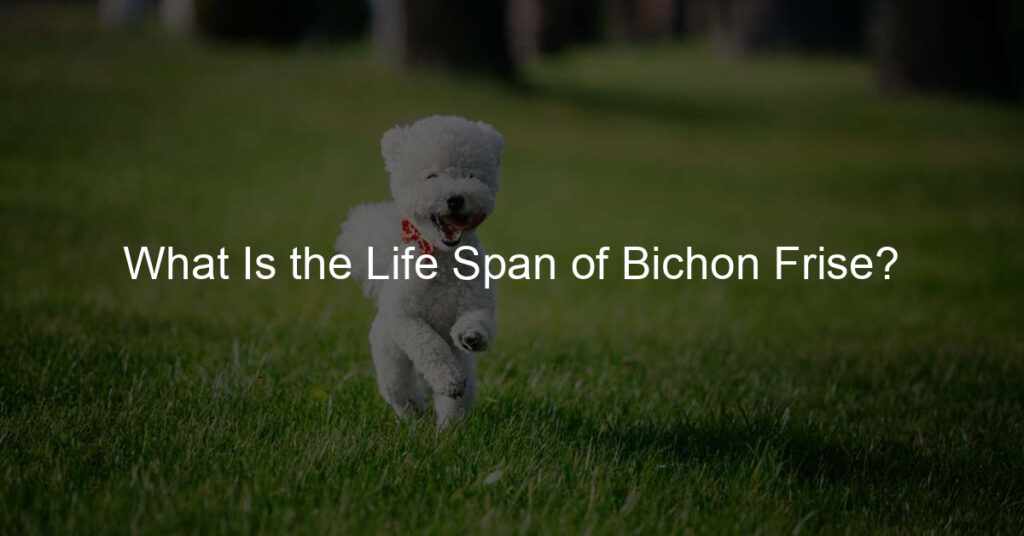As a proud pet parent, one of my main concerns is ensuring a long and healthy life for my furry friend. The Bichon Frise, a small and adorable dog breed, caught my attention with its playful and affectionate nature. I wanted to learn more about their lifespan and how to ensure that these little bundles of joy lead a happy, healthy life.
Turns out, a range of factors, including genetics, health conditions, diet, physical activity, and more, can influence the longevity of a Bichon Frise. Being well-informed about these aspects helps me to make the best decisions for my Bichon’s well-being, from selecting the right diet to providing ample exercise and regular veterinary care.
Key Takeaways
- Bichon Frises are known for their playful and affectionate nature
- Various factors, including genetics, health, diet, and exercise can influence their lifespan
- Proper care, a suitable diet, and regular vet visits are crucial to ensure a long, healthy life for your Bichon Frise
The History of Bichon Frise
I love talking about Bichon Frise’s history! Did you know that the origins of this adorable breed can be traced back to the Mediterranean region, particularly the Canary Islands? They were initially bred as sailing companions, and this likely contributed to their strong affinity for water.
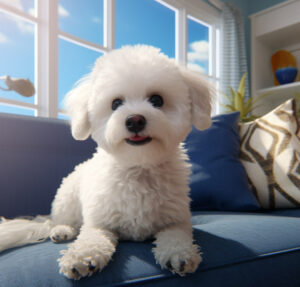
As frequent travelers, Bichon Frises found their way to mainland Spain, where they became popular among the nobility. I find it fascinating that these royal connections eventually led them to the French court. Their cheerful temperament and engaging appearance made them a favorite among French aristocrats, and they were even given the nickname Bichon à poil frisé, which means “curly lap dog.”
During the French Revolution, Bichon Frises lost some of their aristocratic status, as many of their owners faced execution. However, they didn’t lose their charm, as people from different social classes fell in love with this breed. These little dogs quickly found new homes and jobs, often as street performers or circus dogs.
Throughout the 19th and 20th centuries, the Bichon Frise continued to evolve, thanks to dedicated breeders. In the United States, the breed was officially recognized by the American Kennel Club (AKC) in 1972. Today, the Bichon Frise continues to win hearts with its playful, affectionate, and friendly nature.
Characteristics of Bichon Frise
As a Bichon Frise owner, I can confidently say that this breed is truly charming and delightful. One of the most noticeable traits of the Bichon Frise is its size. These small dogs generally weigh between 10 and 18 pounds, making them the perfect lap companions for those who cherish cozy cuddles.
In addition to their small stature, Bichon Frises are known for their curly white hair. This signature non-shedding coat is hypoallergenic, which makes them a popular choice among people with allergies. Grooming is essential to maintain their fluffy appearance, which can make them look like happy little clouds of joy.
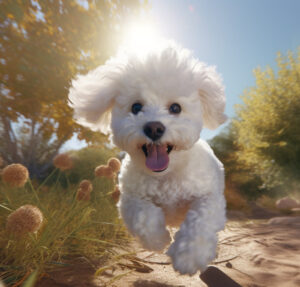
I’ve noticed that Bichon Frises are generally friendly and affectionate. They have a playful nature and enjoy spending time with both children and other pets. My Bichon Frise, for example, loves playing fetch with my kids in the backyard. These purebred pups are sure to brighten up any room with their presence, quickly becoming the center of attention due to their amiable dispositions.
Now, let’s talk about their intelligence. Bichon Frises are eager to please and can be trained rather easily. While they might have a stubborn streak at times, I’ve found that consistency and positive reinforcement go a long way in getting them to learn new tricks and commands. Socialization from an early age is also important to ensure a well-rounded and sociable dog.
In conclusion, those of us who have had the pleasure of sharing our lives with a Bichon Frise can attest to their delightful characteristics. Between their compact size, fluffy coats, and loving personalities, they truly make wonderful pets for people of all living situations and lifestyles.
Understanding Bichon Frise Lifespan
As a Bichon Frise owner, I’ve learned quite a bit about their lifespan and how to ensure their long, healthy lives. Bichon Frise dogs typically have a life expectancy of 12 to 15 years. This longevity makes them a beloved companion for many families. However, it’s essential to understand how to properly care for our senior dogs as they age and face various health challenges.
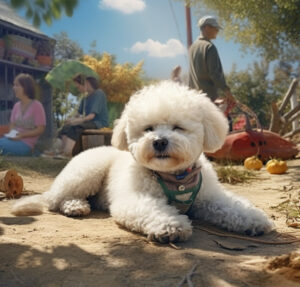
One of the key factors in maintaining a Bichon Frise’s longevity is providing them with a well-balanced diet and daily exercise. Regular veterinary checkups, proper dental care, and grooming are also vital for the health of these adorable dogs. A healthy lifestyle can help prevent common age-related issues such as joint problems, heart disease, and dental problems.
It’s important to be aware of the aging process in our Bichon Frise dogs. As our furry friends enter their senior years, usually around the age of 7, they might experience changes in their behavior, activity levels, and overall health. By staying vigilant, we can address any potential issues early on, which can be crucial for their well-being and longevity.
I find it helpful to keep track of my Bichon Frise’s weight and make adjustments to their diet as needed. Obesity can shorten a dog’s life expectancy and lead to additional health issues. To support their joints and help prevent arthritis, I also opt for special supplements, like glucosamine and chondroitin, with my vet’s guidance.
In summary, understanding the lifespan of our Bichon Frise companions and being proactive with their care is essential for their longevity. As long as we provide them with the love, attention, and care they deserve, our precious Bichon Frise can enjoy a long, happy, and healthy life.
The Impact of Genetics on Lifespan
As a proud Bichon Frise owner, I’ve always been interested in understanding how genetics can impact the lifespan of my fluffy friend. Knowing the role of genetics in a Bichon’s life can help us make better decisions about their healthcare and lifestyle.
One of the most significant factors in the lifespan of a Bichon Frise is their genetic predisposition to certain health conditions. For example, Bichons are prone to develop issues like:
- Hip dysplasia
- Patellar luxation
- Progressive retinal atrophy
- Cushing’s disease
To minimize the risk of inheriting such conditions, it’s essential to choose a reputable breeder who regularly tests their breeding dogs for these genetic health issues.
The various life stages of a Bichon Frise are also crucial in understanding the role genetics plays in their development. From puppyhood to adulthood, each stage comes with its unique challenges and milestones. Keeping an eye on these transitions can ensure that my Bichon grows up healthy and strong.
Sex also affects the development and lifespan of a Bichon Frise. Although both sexes generally have similar lifespans, it is worth considering that females tend to reach sexual maturity slightly earlier than males. This can affect their physical growth and overall development.
As a responsible pet owner, I always keep my Bichon’s genetics in mind when considering their healthcare needs and overall well-being. By understanding how genetics influence their lifespan, we can give our Bichon Frises the best chance at a long and happy life.
Bichon Frise Health Conditions
As a dog lover, I’m always concerned about potential health issues that our canine friends face. The Bichon Frise is a lovely little breed, but like all dogs, they can be prone to certain health conditions. In this section, I’ll discuss some of the common health concerns for the Bichon Frise.
One thing I’ve noticed among Bichon Frises is that they are prone to obesity. This is an issue you’ll want to keep an eye on, as it can lead to other health problems such as diabetes, arthritis, and heart disease. To keep your Bichon healthy, make sure to provide them with the right diet and regular exercise.

There are also some common orthopedic issues that Bichon Frises might face. These include luxating patella, hip dysplasia, and elbow dysplasia. Regular check-ups and keeping an eye on your pet’s movement can help you detect these issues early on and allow for appropriate treatment when necessary.
In addition to these orthopedic issues, Bichon Frises are also prone to certain eye conditions such as cataracts and retinal atrophy. Be sure to regularly examine your dog’s eyes for any cloudiness or changes in vision, and seek veterinary care if you notice anything unusual.
Ear infections can be another common health concern for Bichon Frises. Their fluffy ears are something I adore, but unfortunately, they can trap moisture and bacteria, leading to infections. You can help prevent these by routinely cleaning your dog’s ears and keeping them dry.
Lastly, bladder infections can sometimes occur in Bichon Frises. If you notice any signs – such as frequent urination, blood in the urine, or straining to urinate – make sure to consult your veterinarian for diagnosis and treatment.
While there are quite a few health conditions to be aware of, I believe that with proper care and regular veterinary check-ups, your Bichon Frise can lead a happy and healthy life. It’s important to stay vigilant and proactive with their healthcare, so they can remain the wonderful companions that they are.
Key Factors Contributing to Lifespan
I think it’s essential to understand that several factors contribute to the lifespan of a Bichon Frise. In this section, I’ll discuss some of the key aspects that can impact this adorable breed’s life expectancy.
Firstly, diet and nutrition play a significant role in any dog’s life, including the Bichon Frise. Providing them with a well-balanced and high-quality diet helps to ensure they receive the necessary nutrients for healthy growth and development. To keep your Bichon in good health, I recommend consulting a veterinarian about their dietary needs and adjusting their food intake based on their age, size, and activity level.
In addition to diet, regular exercise is vital for Bichon Frise’s overall health and well-being. Daily walks and playtime help to keep their bodies strong and minds stimulated. Engaging in physical activities can also help reduce the risk of obesity and other health complications. I find it important to establish an exercise routine that suits your Bichon’s individual personality and needs.
The environment in which a Bichon Frise lives can have a significant influence on its lifespan as well. This breed thrives in warm, dry climates and can be sensitive to extreme temperatures. Make sure your Bichon has a comfortable, safe living space with access to shade or shelter, and maintain a consistent temperature inside your home to avoid unnecessary stress.
Speaking of stress, it’s crucial to recognize that Bichons, like humans, can experience stress and anxiety. Too much stress can potentially lead to health issues and a decreased lifespan. To minimize stress for your Bichon Frise, provide them with a stable routine, socialization, and positive reinforcement training methods. Addressing their emotional needs and keeping them engaged in their daily lives can significantly contribute to their happiness and longevity.
Lastly, environmental factors like pollution and exposure to harmful chemicals could impact the lifespan of a Bichon Frise. I believe it’s essential to be mindful of the products you use around your home and consider opting for natural, non-toxic alternatives whenever possible. Regular grooming and bathing can also help keep your Bichon’s skin and coat healthy and free from irritants and allergens.
Taking all these aspects into account and providing your Bichon Frise with the best possible care can help ensure they live a long, happy, and healthy life.
Effective Diet for Bichon Frise
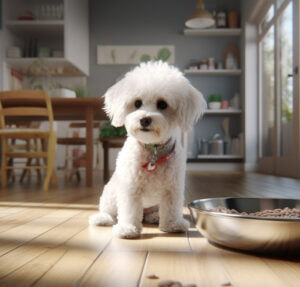
When it comes to ensuring a long and healthy life for my Bichon Frise, I know that a balanced and nutritious diet is essential. Here’s what I found works best for my furry friend.
First off, I make sure to include enough proteins in their diet. Proteins are vital for maintaining strong muscles, healthy skin, and coat. I choose high-quality, lean meats like chicken, turkey, and fish to meet those needs. On the other hand, overeating can cause obesity and health issues, so I always keep an eye on portion sizes.
Vegetables are also an important part of my Bichon Frise’s diet. Providing a good mix of vitamins and minerals, I add some vegetables like carrots, green beans, and peas to their meals. In moderation, fruits such as blueberries, apples, and cranberries can also be added for extra antioxidants and nutrients.
When it comes to vitamins, I make sure my Bichon Frise gets all the essentials, like vitamin A for healthy eyes and skin, vitamin E for immune support, and B vitamins for energy production and overall well-being. For minerals, calcium and phosphorus are crucial for strong bones and teeth, while potassium and magnesium support the nervous system and muscle function.
As for human foods, it’s important for me to remember that certain items can be toxic to dogs. I avoid feeding my Bichon Frise chocolate, grapes, raisins, onions, and other potentially harmful human foods. Instead, I stick to a high-quality diet specifically designed for dogs.
Grain-free diets have become popular, but I’ve learned that they are not necessarily the best choice for all dogs. Some Bichon Frise may have allergies or sensitivities to specific grains, while others might benefit from the additional fiber found in whole grains like brown rice and oatmeal. I base this decision on my dog’s individual needs and the advice of my veterinarian.
To sum up, a high-quality, balanced diet that includes proteins, vegetables, and carefully selected fruits and grains, combined with appropriate vitamins and minerals, helps me keep my Bichon Frise healthy and happy. By avoiding overeating and harmful human foods, I’m confident that I’m doing my best to ensure a long and fulfilling life for my little companion.
Exercise and Physical Activity Guidelines
As a Bichon Frise owner, I know firsthand the importance of exercise and physical activity for my dog’s overall well-being and long life. A balance of playtime and structured activities will help keep my Bichon Frise happy, healthy, and engaged.
Daily walks are essential for my Bichon Frise. It’s important to consider the duration and intensity of the walks based on my dog’s age, fitness level, and overall health. In general, I aim for two to three shorter walks (about 15 to 20 minutes each) a day to provide my dog with both physical exercise and mental stimulation while allowing them to socialize and explore their environment.
In addition to walks, I also make sure my Bichon Frise has ample playtime every day. My dog loves playing fetch with toys and balls. This provides both physical exercise and bonding time between us. I am always careful to choose appropriate toys for my Bichon Frise, taking into consideration the size, material, and durability.
Agility training can be a great way to keep my Bichon Frise active, especially during the winter months when outdoor play may be limited. I can set up small obstacles or courses at home or find local obedience or agility classes for dogs. This type of activity not only helps my Bichon Frise work on their physical fitness but also helps with their discipline and mental well-being.
In summary, as a Bichon Frise owner, it’s important for me to provide regular exercise and physical activities tailored to my dog’s needs. With the right balance of daily walks, playtime, and engagement in agility training, I can contribute to a healthy, happy life for my beloved Bichon Frise.
Importance of Regular Vet Check-Ups
As a responsible Bichon Frise owner, I cannot stress enough the importance of regular veterinary check-ups. Each time I bring my furry friend to the vet, I know I’m ensuring their overall health and well-being. Just like humans, our pets may have underlying health issues that we cannot see. Preventative care plays a huge role in the long and happy life of a Bichon Frise.
Dental Disease: Dental issues are common in Bichon Frises. I always make sure to have my dog’s teeth checked at least once a year. Regular dental cleaning and at-home care can help prevent severe dental diseases that might lead to tooth loss and pain.
Bladder Stones: Bichon Frises are prone to bladder stones, which can cause discomfort and serious health complications if not addressed. During veterinary check-ups, the vet will typically examine my dog’s urine sample to identify any potential concerns. Prompt treatment and dietary adjustments can help prevent further issues and ensure my dog’s comfort.
Other Health Issues: Bichon Frises may be predisposed to certain health conditions, such as allergies, hip dysplasia, and patellar luxation. Regular check-ups allow the vet to monitor my dog’s well-being and address any concerns before they become more severe.
In addition to these specific health concerns, general check-ups are essential for my Bichon Frise’s overall health. During the visit, the vet typically examines my dog’s body from head to tail, checking their heart, lungs, skin, and joints. They will also discuss immunizations and parasite prevention, ensuring both my and my dog’s protection.
Overall, a friendly approach and taking my Bichon Frise for regular veterinary check-ups have truly made a difference in their lifespan and the quality of life we share together. By scheduling consistent vet appointments, I know I am doing everything I can to keep them healthy, happy, and with me for as long as possible.
The Need for Proper Grooming
As a Bichon Frise owner, I cannot stress enough the importance of proper grooming for these dogs. Their fluffy white coats are not only beautiful to look at but also require regular care to keep them clean, soft, and tangle-free. Grooming is also essential for their overall health, as it helps prevent skin issues, ear infections, and dental problems.

I make it a point to brush my Bichon’s coat daily to prevent matting and keep it looking nice. This daily routine also allows me to bond with my furry friend and check for any signs of skin irritation or parasites. I find it helpful to use a slicker brush followed by a comb to ensure that I am reaching all layers of their fur.
Bathing plays a significant role in Bichon’s grooming process. I prefer to bathe my dog every three to four weeks, using a gentle dog shampoo and conditioner to maintain their coat’s softness. It’s important to rinse thoroughly and gently dry their hair afterward to avoid any irritation.
Dental care is another crucial aspect of grooming. Bichons are prone to dental issues, so I make sure to brush my dog’s teeth regularly to remove plaque and bacteria buildup. Using a dog-specific toothpaste and a soft toothbrush, I gently brush in a circular motion, paying close attention to their gum line.
In addition to coat and dental care, I always ensure to clean my Bichon’s ears and trim their nails. I use a gentle ear cleaner to help prevent infections and a nail clipper designed for small breeds. Taking the time to provide regular grooming not only keeps my Bichon Frise looking lovely but also contributes to a long, healthy life.
Training and Socialization of Bichon Frise
As a Bichon Frise owner, I find it essential to pay attention to proper training and socialization for these little dogs. Bichon Frises are generally intelligent and eager to learn, which makes training a relatively easy process. However, it’s important to keep a few things in mind while training your Bichon Frise.
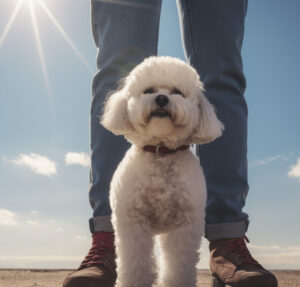
First, Bichon Frises respond well to positive reinforcement, such as treats, toys, and praise. Reward their good behavior and avoid harsh punishment to ensure a happy and stress-free experience. I like to keep training sessions short and engaging, as Bichon Frises can have a short attention span. Remember to be consistent and persistent to ensure the best results!
Socialization is an equally important aspect of raising a well-adjusted Bichon Frise. Since they are a naturally friendly and affectionate breed, socializing your Bichon should be a fun and satisfying experience for both you and your dog. By exposing them to new environments, people, and other dogs, you can help prevent potential issues, such as separation anxiety. Regular walks, trips to the dog park, and playdates with other dogs are great ways to ensure your Bichon Frise gets plenty of socialization.
One common challenge for Bichon Frises is separation anxiety, as they become quite attached to their owners. It’s essential to address this issue during training and socialization to help your dog feel secure when you’re not around. Gradually increase the duration of time away from your Bichon Frise to help them acclimate to being alone. Also, providing them with mentally stimulating toys can help keep them engaged and reduce their anxiety when you’re not home.
In conclusion, proper training and socialization are vital for ensuring a well-behaved and confident Bichon Frise. With patience, consistency, and plenty of positive reinforcement, you and your Bichon Frise can enjoy a strong, happy bond for years to come.
Creating a Comfortable Environment
As a Bichon Frise owner, it’s my responsibility to provide a comfortable and safe environment for my furry companion. Here are a few things I do to ensure their well-being.
First, I make sure to give my Bichon Frise access to fresh water at all times, both indoors and outdoors. This ensures they stay hydrated and healthy. To keep the water clean, I use a water bowl with a filter or change the water frequently.
When it comes to shelter, I ensure that my Bichon Frise has a cozy and designated space to sleep and rest. This can be a dog bed or a crate placed in a serene area of my home. I also provide a blanket or comforter to keep them warm, especially during cooler months.
Another aspect of a comfortable environment for my Bichon Frise is temperature control. I pay attention to the temperature inside my home, making sure it’s not too hot or too cold. During extreme weather conditions, I bring my Bichon Frise indoors and use heating or air conditioning as needed.
Safety is a crucial factor in creating a comfortable environment. I ensure that all potentially harmful items, such as cleaning products or small objects, are securely stored away from my Bichon Frise’s reach. I also use baby gates or pet barriers to prevent them from entering dangerous areas like the kitchen or garage.
Finally, I like to offer my Bichon Frise various toys and play activities to keep them engaged and content. This can include chew toys, puzzle toys, and regular play sessions with me, either indoors or outdoors, to promote mental stimulation and physical exercise.
By taking these steps, I am doing my best to create a safe, comfortable, and enjoyable environment for my Bichon Frise, which ultimately contributes to their overall health and happiness.
Frequently Asked Questions
How long do Bichons typically live?
Bichon Frises typically live for about 12 to 15 years. However, with excellent care and a healthy lifestyle, some Bichons have been known to live even longer, reaching 16-18 years of age.
What health problems are common in Bichon Frises?
While Bichon Frises are generally healthy dogs, they can be prone to certain health issues. Some common problems include:
- Allergies: Bichon Frises have sensitive skin and may develop allergies to certain things like pollen, mold, or food ingredients.
- Hip dysplasia: This is a hereditary condition where the hip joint doesn’t form properly, potentially leading to arthritis and pain.
- Patellar luxation: This occurs when the kneecap slips out of position, causing discomfort and limping.
- Eye issues: Bichons can develop cataracts, progressive retinal atrophy, or tear stains.
It’s important to have regular vet check-ups to catch any health problems early.
What factors affect Bichon Frise’s lifespan?
There are several factors that can contribute to the lifespan of a Bichon Frise, including:
- Diet: A balanced diet is essential for Bichon’s overall health and longevity.
- Exercise: Regular exercise keeps them active and fit and can help prevent obesity and other related issues.
- Health care: Regular vet check-ups, vaccinations, and preventative care such as dental cleanings and flea/tick prevention are crucial for a Bichon’s well-being.
- Genetics: Purebred Bichons may be at higher risk for certain health issues due to genetic factors.
Do Bichon Frises have genetic issues?
Like any purebred dog, Bichon Frises may be predisposed to some genetic health issues. Among these are hip dysplasia and certain eye problems. It’s essential to choose a reputable breeder who performs health tests to reduce the risk of genetic issues in your Bichon.
What are the life stages of a Bichon Frise?
A Bichon Frise’s life stages include:
- Puppy (0-12 months): During this stage, Bichons grow rapidly and require a lot of attention, training, and socialization.
- Adolescent (12 months-3 years): Bichons reach physical maturity but may still display some puppy-like behavior.
- Adult (3-10 years): This is the prime stage of a Bichon’s life, where they are fully grown and have established their personalities.
- Senior (10+ years): Their energy levels may decrease, and they may develop age-related health issues.
What is the oldest recorded age for a Bichon Frise?
The oldest recorded age for a Bichon Frise is 20 years old. While this is quite rare, it highlights the potential for Bichon Frises to live long, healthy lives with proper care and attention.

